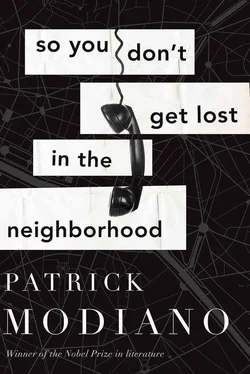“You probably came by bus?” Dr Voustraat asked him.
“Yes.”
The doctor checked his wristwatch.
“I can’t take you back to Paris by car unfortunately. The last bus for Porte d’Asnieres leaves in twenty minutes.”
Outside, they walked along rue de l’Ermitage. They passed in front of the long concrete building that had replaced the garden wall, but Daragane did not wish to recall this vanished wall.
“A good deal of mist,” said the doctor. “It’s winter already. .”
Then they walked in silence, the two of them, the doctor very erect, very upright, the bearing of a former cavalry officer. Daragane could not remember having walked like this, at night, in his childhood, along the streets of Saint-Leu-la-Forêt. Except for once, at Christmas, when Annie had taken him to midnight mass.
The bus was waiting, the engine turning over. He would evidently be the only passenger.
“I’ve been delighted to chat with you all afternoon,” said the doctor, holding out his hand. “And I’d love to hear more about your little book on Saint-Leu.”
At the very moment Daragane was about to get on the bus, the doctor held him by the arm.
“I was thinking of something. . about La Maladrerie and all those curious people we spoke about. . The best witness could be the child who once lived there. You would need to find him. . don’t you think so?”
“That will be very difficult, doctor.”
He sat at the very rear of the bus and looked through the window behind him. Dr Voustraat stood there motionless, probably waiting for the bus to disappear round the first corner. He gave him a wave.
IN HIS STUDY, HE DECIDED TO RECONNECT THE TELEPHONE and the answering machine in case Chantal Grippay should try to get in touch with him. But no doubt Ottolini, back from the casino at Charbonnières, was not letting her out of his sight. She would have to collect the black dress with swallows. It was hanging there, on the back of the sofa, like those objects that don’t want to leave you and follow you around all your life. Rather like that blue Volkswagen in his youth that he had had to get rid of after a few years. Yet, every time he moved home, he found it parked outside his building — and that had gone on for a long time. The car remained faithful to him and followed him wherever he went. But he had lost the keys. And then, one day, it had disappeared, perhaps into one of those automobile scrap-yards, beyond Porte d’Italie, on the site where they had begun staking out the Autoroute du Sud.
He wished he could have found “Return to Saint-Leu-la-Forêt”, the first chapter of his first book, but his search would have been pointless. That night, as he was admiring the attractive leaves in the courtyard of the building next door, he realised that he had torn up that chapter. He was certain of it.
He had also discarded a second chapter: “Place Blanche”, written immediately after “Return to Saint-Leu-la-Forêt”. And so he had started all over again from the beginning with the painful sense that he was correcting a false start. And yet the only memories he retained of this first novel were the two chapters he had discarded that had served as underpinning for everything else, or rather the scaffolding you remove, once the book is finished.
He had written the twenty pages of “Place Blanche” in a room at 11 rue Coustou, a former hotel. He was living in lower Montmartre again, fifteen years after discovering it because of Annie. In fact, they had ended up there, when they had left Saint-Leu-la-Forêt. And that is why he thought he could write a book more easily if he returned to the places he had known with her.
They must have changed in appearance since that time, but he was barely aware of the fact. Forty years later, in the twenty-first century, in a taxi one afternoon, he happened to be passing through the neighbourhood. The car had stopped in a traffic jam at the corner of boulevard de Clichy and rue Coustou. For a few minutes, he had not recognised anything, as though he had been struck with amnesia and was merely a stranger in his own city. But for him this was of no importance. The fronts of the buildings and the crossroads had, over the course of years, become an inner landscape that had eventually come to cover over the sleek and well-stuffed Paris of the present day. Over there, on the right, he thought he could see the garage sign in rue Coustou and he would gladly have asked the taxi driver to drop him there so that, after forty years, he could revisit his old room.
In those days, on the floor above his, they were starting the building works that would transform the old hotel bedrooms into studio flats. In order to write his book without hearing the sounds of hammering on the walls, he took shelter in a café on rue Puget that formed the corner with rue Coustou and was overlooked from his bedroom window.
In the afternoons, there were no customers in this establishment known as the Aero, a bar rather than a café, to judge by its pale wood panelling, its ornamental ceiling, its equally pale wooden frontage, with a window protected by a sort of moucharaby. A man of about forty, with dark hair, used to stand behind the bar, reading a newspaper. During the course of the afternoon, he would sometimes disappear up a small staircase. The first time, Daragane had called to him so that he could pay his bill, but to no avail. And afterwards, he grew accustomed to his absences and left him a five-franc note on the table.
He had to wait for a few days before the man spoke to him. Up until then, he ignored him deliberately. Every time Daragane ordered a coffee, the man appeared not to hear him, and Daragane was astonished when he eventually switched on the percolator. He came and placed the coffee cup on the table without even glancing at him. And Daragane sat down at the back of the room as if he himself wished to go unnoticed.
One afternoon when he had managed to correct a page of his manuscript, he heard a solemn voice:
“So, are you doing your accounts?”
He looked up. Over there, behind the bar, the man was smiling at him.
“You come at the wrong time. . In the afternoons it’s deserted here.”
He walked over to his table, still with the same quizzical smile:
“May I?”
He pulled out the chair and sat down in front of him. “What exactly are you writing?”
Daragane hesitated before replying.
“A detective story.”
The other man nodded and gave him a searching stare.
“I live at the building on the corner, but there are refurbishments going on and there’s too much noise to be able to work.”
“The former Hotel Puget? Opposite the garage?”
“Yes,” said Daragane. “And you, have you been here long?”
He would often change the subject in order to avoid talking about himself. His method was to reply to one question with another one.
“I’ve always been in the neighbourhood. Before that, I ran a hotel, a little further down, on rue Laferrière. .”
This word, Laferrière, made his heart thump. When he had left Saint-Leu-la-Forêt with Annie to come to this neighbourhood, they both lived in a room on rue Laferrière. She would be away, from time to time, and she gave him a duplicate key. “If you go for a walk, don’t get lost.” On a sheet of paper folded in four that he kept in his pocket, she had written: “6 rue Laferrière” in her big handwriting.
“I knew a woman who used to live there,” said Daragane in an expressionless voice. “Annie Astrand.”
The man looked at him in surprise.
“Then you really must have been very young. That’s about twenty or so years ago.”
“I’d say more like fifteen.”
“I mainly knew her brother Pierre. It was he who lived in rue Laferrière. He ran the garage next door. . but I haven’t heard anything of him for a long time.”
Читать дальше












